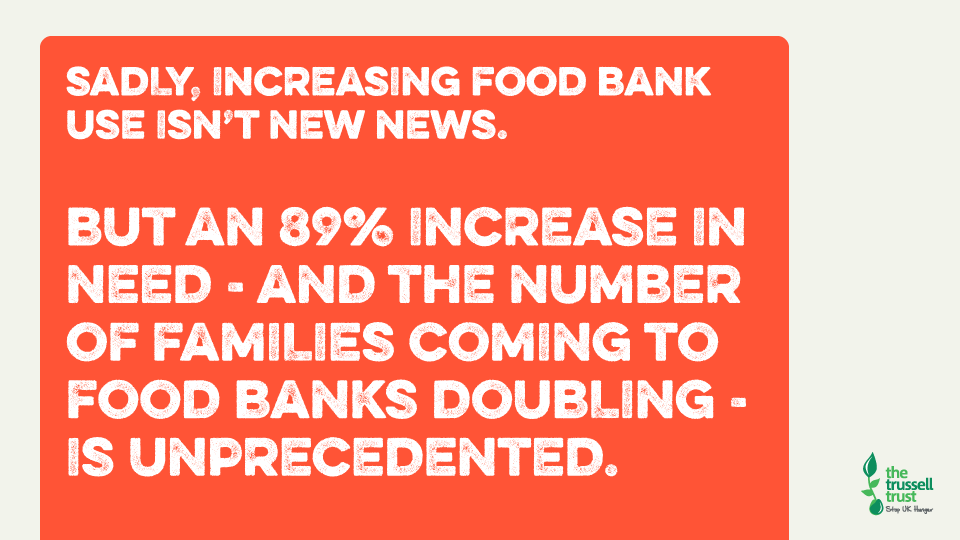Emma Revie, chief executive
In ‘normal’ times, Ruth* works every hour under the sun in catering for an events company to provide for her family. But in mid-March, before the coronavirus pandemic had reached its peak in the UK, she found herself at a food bank collecting an emergency food parcel.
She was already just getting by from one payslip to the next – but when all the events company’s bookings were cancelled and she lost her shifts, it was impossible to make ends meet.
It isn’t right that Ruth was forced to use a food bank to get by. It isn’t right that anyone in our country is forced to use a food bank to get by. Each one of us deserves the dignity of having enough money to buy the essentials we need for ourselves and our families.
But this week, food banks across the UK have reported their busiest month ever as thousands of women, men and children find themselves in or on the brink of destitution, forced to seek emergency food to survive. Compared to April last year, food banks in the Trussell Trust network saw a staggering 89% increase in need, including a 107% increase in the number of children receiving emergency food parcels.
We all agree this must change. But how?
During the last few months we’ve heard lots of suggestions that focus on getting food to people who can’t afford it. But food isn’t the answer to people needing food banks. Food can’t be used to cover the cost of heating, lighting, rent or mortgages, and food won’t help a family buy school shoes, period products or bus tickets.
If we want to end the need for food banks, we need to focus on getting money into people’s pockets.
We welcome the government’s decision to put in place the Job Retention Scheme and the Self-Employed Income Support Scheme, and measures like the increase in Universal Credit payments. That scale of intervention has held many people from falling into destitution.
But the unparalleled speed and scale of the increase in people needing food banks shows these interventions don’t offer enough protection to everyone who needs support. Instead, they’ve shone a light on how fragile people’s safety nets are.
That’s why as part of a coalition of charities, including the Independent Food Aid Network, Child Poverty Action Group, The Children’s Society, Joseph Rowntree Foundation, StepChange and Turn2us, we’re calling on the government to do more and create a temporary Coronavirus Emergency Income Support Scheme, which will ensure everyone has enough money for the essentials.
If we want to protect more people like Ruth from needing a food bank as the economic impacts of coronavirus unfold, we must act with urgency. Each and every one of us must be treated with dignity and compassion. And none of us should left behind.
We know things are uncertain but with your support, our government could make a real difference to the lives of people needlessly swept into poverty throughout this crisis.
Email your MP to ask them to back our calls and together we can make a difference.
We believe that if we act together, #ThisCanChange – do you?



